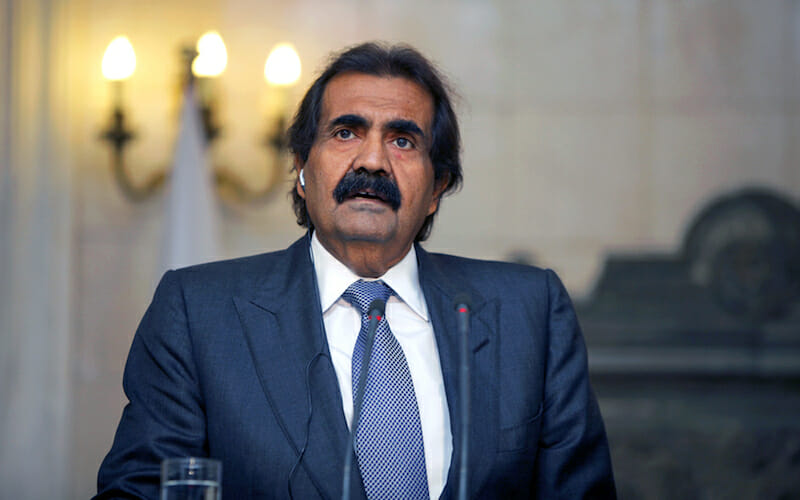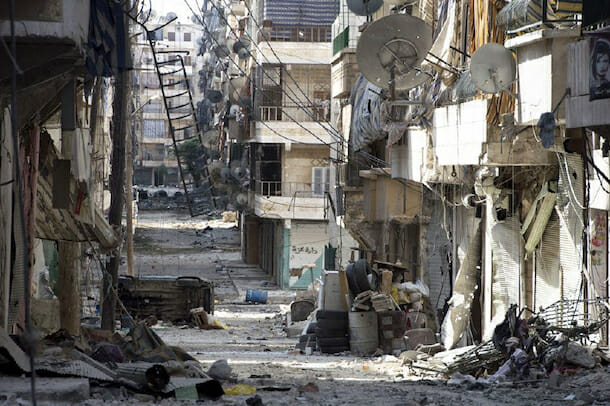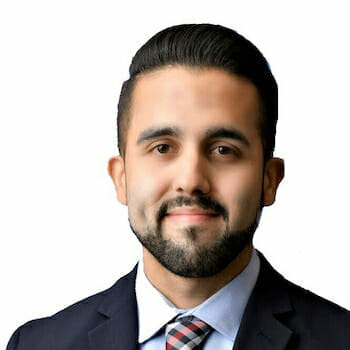
Doha’s Diplomatic Potential in Syria
As Syria enters a new phase that borderlines larger conflict with the coordination of forces between the US, France, the UK, and reportedly, Israel too, it is important to bring into the narrative a new player for diplomatic efforts. Additionally, given the developments in Syria with Russia and other unaligned factions (Iran, Hezbollah, among others), Qatar long-standing diplomatic ability to maintain close relations with all major powers – despite their different stances—could become a great political tool, in conjunct with its SWF (Sovereign Wealth Fund), to influence a settlement in Syria and use its (envied) prominence among its neighbors to bring about an agreement on regional rules of governance and post-conflict reconstruction.
Especially as President Trumps is keenly interested in creating an indigenous Arab force of aligned partners in the Gulf to take over for the US. In this arrangement, Gulf countries would be responsible for funding and setting up more troops after the US defeats Daesh, as it was mentioned by Trump on Friday 13th when he decided to strike Syria: “America does not seek an indefinite presence in Syria. It’s a troubled place. We will try to make it better. But it’s a troubled place.”
It is an initiative that it is taking force within the White House especially. However, as there is a general concern on Russia’s strategy after the US leaves (especially among Sunni Gulf States), there’s a diplomatic heavyweight that has the potential to apply leverage to both sides and prevent the region from being dominated by hostile forces.
Qatar, even after the most recent blockade imposed by Saudi Arabia, Bahrain, and the UAE, seems to be standing up for itself, accelerating measures that will improve international trade routes and economic diversification.
Remarkably, the role of Qatar in this new indigenous Arab force can become extremely strategic for the US and Russia as a vital and wealthy intermediary that could be playing a more effective role on the ground. Moreover, Al Jazeera’ vital role as a Doha-based regional Arab News network has certainly enhanced Qatar’s emergence as an important regional player, whose role in bringing and balancing promising relations with ideologically different groups portray an ability and willingness to engage further in constructive and all-inclusive settlements to regional crises such as the one in Syria.
Russian-Qatari Ties
Among those partners that have different ideological objectives in regional crises is Russia, who along with Qatar, is among the world’s top largest producers of natural gas. Which means that Qatar tends to be seen as an alternative provider of natural gas in the Eastern Mediterranean and other countries along the Russian periphery. Therefore, it has always been in the interests of Russia to find a partner in Qatar and act together (instead of separately) to control the natural gas market.
Additionally, given Al-Jazeera’s well-gained respect in the Arab World, Russia is certainly interested in keeping Qatari and Russian relations on a positive trajectory, hoping that this will motivate the network to portray good coverage of Russian influence in the region. This is something that will be very unlikely if relations between the two countries are tense.
Yet, in light of Russia growing influence as a key player in the region, it is also in the interest of Qatar to have good relations with Russia, and remain a diplomatic heavyweight that has always “attempt to maximize its number of friends and minimize its number of enemies.” At this point there is plenty of evidence to back this allegation, especially when Qatar remains an important US ally, but also maintains a favorable public opinion in the Arab World, and has substantial relations with Russia and Iran.
Moreover, Qatar’s investment in the Russian economy has been increasing significantly in recent years. Qatar’s investments in Russia go up to $2.5 billion, in addition to $500 million in the Russian bank VTB. In the gas realm, Qatar now owns around 40% of the Russian Gas Giant Rosneft, which is about $11.3 billion, making the countries’ ties firmer and helping solidify the partnership between both nations in regards to Syria, as it was the case of Qatar’s inclusion in the Astana talks. Therefore, the deal between Rosneft and Doha made sure that there was little rivalry between both countries to control the gas market. Instead, the deal’s arrangements assisted in mobilizing an inclination to advance their diverse strategies and diplomatic measures in regard to Syria. Both sides have indeed different interests in Syria, yet, the implications of the global gas market, Russia neorealist approach (states that power is the most important factor in international relations) in international affairs, and Qatar’s diplomacy have facilitated significantly the reaching of an understanding between both parties.
Doha and Moscow’s relations are expected to keep growing, and recent examples of Russian and Qatari cooperation show a commitment to find a solution to the Syrian’s people suffering and continue to facilitate solutions to other regional conflicts. Qatar understands Russia’s major role in the region and has remained focused on the fact that fighting violent terrorism continues to be a pragmatic imperative to end regional crises. In this regard, Al-Thani’s remarks in 2016 during his first official visit to Russia portray a priority on addressing grievances that lead to violent extremist: “Fighting its (terrorism’s) emergence and causes are more important because if we did not fight such matters it will persist and we will not be able to end it permanently.”

Certainly, ties between the Kremlin and Doha have been strengthened by the on-going blockade of the Quartet on Qatar. Most recently, in March 2018, Moscow and Doha conducted a presidential meeting in Moscow to reinforce their bilateral economic cooperation, and discuss the worsening situation in Syria.
However, things can always go wrong, and there are no historical precedents of trust between Russia and Qatar, but as the US keeps retreating from international world politics, Russia remains keen on becoming the chief commander of Eurasian affairs. However, despite risks, both leaders remain keenly positive that their ties will be reinforced thanks to on-going economic and humanitarian agreements.
Where is the US in all this?
Despite Russia’s willingness to apply a greater role in international politics, the US remains one of Qatar’s main partners, especially in regard to security. Qatar and Washington hold a similar stance in Syria and collaborate in different spheres to tackle the issue of international violent extremism. Additionally, the largest US military base, the Al Udeid Air Base, remains in Qatar, and it is home to the US Central Command, which houses 10,000 US military personnel from the US, UK and other nations, and has been essential in the fight against Daesh.
It appears to be then that Doha’s diplomatic skills came to stay, as the blockade imposed has just helped Qatar boost its relationship with the US, and maintain an economic trade relationship of more than $125 billion, a figure that is expected to double in coming years. In the most recent meeting between Trump and the Qatari Emir Al Thani last week, both leaders agreed on the fact that there is a strong agreement in working together in regard to Syria and tackling other regional crises, such as the latest chemical attack by the Assad regime.
Significantly, Qatar has maintained contact with both the US and Russia in an effort to bring about a solution to the Syrian crisis. Most recently, Qatar has shown interest in participating in post-reconstruction efforts, where a balanced alliance with both players would guarantee that the Emirate can have a participatory and financially authoritative role in post-conflict reconstruction.
Qatar’s Sovereign Wealth Fund as Leverage in Syria and Elsewhere
Qatar’s growing economic diversification and international influence have come to push back the Saudi-led blockade. The Quartet countries have accused Qatar of “terrorism,” allegations that have been repeatedly denied by Qatar. In reality, the blockade seems to have boosted Qatar’s already impressive diplomatic capabilities, and it has helped deepen its ties with Iran, Russia, the US, and Turkey.
Additionally, the Qatari economy continues to have a $335 billion sovereign wealth fund and has invested more than $30 billion in stocks and other assets.
Despite the blockade, the tiny Emirate remains the world’s richest country per capita, with its 250,000 native citizens living on around $400,000 per capita income. Qatar has also used this wealth to become a major financial player, and likewise, it has helped Doha gain political influence in the region, and the world. Therefore, it is rational to accept that political ramifications are being drawn by the Qataris’ large revenue, which was already a significant figure before the blockade.
Actually, the blockade assisted (perhaps unintentionally) the Emirate in speeding its economic reforms and the diversification of its economy; and in stretching ties with other countries, that will, in the long term, benefit Qatar and its focus to continue moving away from full dependency on gas and oil reserves.
Additionally, Qatar most recently raised $12 billion in debt from foreign investors, which shows a continuous confidence by the international banking sector in Doha’s large financial market. Qatar came out stronger after the Saudis’ sudden decision to announce its own sales of bonds in the same week as Doha, with the alleged intention to reduce cash flows available to Qatar. However, Saudi came short at $11 billion, adding this incident to a long list of failed attempts to strike an economy that is already under pressure, yet flowing.
With a visionary ruling Qatar and trying to develop homegrown capabilities that defuse the effects of the blockade, while strengthening his popularity, Doha will have to continue moving towards a combination of all elements available (economic, political and military) to protect its interests at home and abroad. The economy has shown itself to be resilient, and it can sustain the blockade in the long-term. At the same time, Al-Jazeera’s impressive journalism must remain a key independent and indigenous player in promoting free-press, civil liberties, the right to dissent, and informing the Arab World from an insider perspective.
However, in a region of turmoil, the GCC’s union has been and will remain a stable unit, and all efforts to resolve the crisis must be canaled to effectively reduce the continual weakening of the GCC as an important unit of cooperation. Although, the GCC countries have no positive precedent in working with each other to solve regional crises, the empowerment of the GCC should not be seen as a US endorsement to broader the Sunni-Shiite sectarian conflict. This is where Doha’s ties with Iran, and its new independent stance gain strength as a potential regional broker.
As Doha strengthens its new-found capabilities to promote indigenous opportunities of economic and sustainable development, it has also found an advantage with its independent resilience that can help it become a more influential player in bringing about a solution to regional crises, especially in Syria. The blockade has allowed Qatar to expand its market, and rely on more than 80 countries for trade, rather than relying on a limited set of neighboring countries. Qatar’s exports surged in January 2018 due to the hydrocarbon sector, with the trade surplus up over 50% year-on-year and industrial production also improving…Far from holding back the state, the blockade has helped energize Qatar in the pursuit of self-sufficiency and ensure sustainability of the local economy.
The combination of the recently-discovered capabilities of economic independence; the already existing diplomatic skills, and a wealthy sovereign fund will put Qatar in favorable standing for reconstruction efforts, and it can lead it to influence a final resolution to Syria’s civil war. Moreover, its financial authority and capacity as a powerful political tool can deepen Qatar’s leverage in the new Russian state of affairs in the Middle East.
Certainly, Doha plays well its diplomatic influence in the international arena, and the blockade did certainly bring this discussion into the spotlight. As Qatar’s cooperation with Russia grows, it will be in the interest of the United States to keep Doha a close ally and further its relationship if it continues to be interested in exercising leverage and diplomatic efforts on Moscow and Tehran.
Despite that Moscow and Doha differ greatly in regard to Assad, the future of Qatar’s sovereign fund wealth seems to point towards an interest in Syria, and a greater commitment to post-conflict reconstruction, which will ensure Qatar’s influence in the Levant, and a better chance to make investments. But, as in the past, Doha will certainly be able to find a balance between its own interests and those of the Kremlin and Washington.
Doha’s support for the rebels has yet to yield any positive result, hence Qatar’s decision to remain interested in post-conflict efforts that will give Doha the same, or even greater leverage in Syria, and in the international arena efforts along Russia and the United States to create the conditions necessary to move forward a path that leads to returns on investment, political solutions, and an end to the conflict.
The views expressed in this article are those of the author alone and do not necessarily reflect those of any institutions with which the author is associated.

